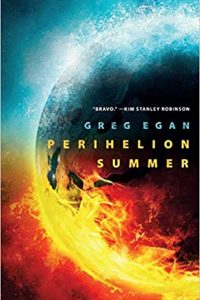Rich Horton Reviews Short Fiction: Analog, Asimov’s, Uncanny, and Black Infinity
 Analog 3-4/19
Analog 3-4/19
Asimov’s 3-4/19
Uncanny 3-4/19
Black Infinity Fall ’18
The March-April issue of Asimov’s is a special issue in memory of their great former editor Gardner Dozois, who died about a year ago. As such, it includes his Nebula Award-winning story “The Peacemaker“, many brief memoirs of his effect on writers, and, of course, plenty of new stories. There is a novella from Greg Egan, “Instantiation“, a sequel to last year’s “3-adica”. The intelligent “non-playing characters” from the previous story, led by Sagreda, realize that the gaming platform on which they’ve carved out space is in trouble and may become obsolete. They need to look for a way out to a different platform, which involves some intriguing stuff, such as impersonating Kurt Gödel. Even more intriguing, I think, is the new platform for which Sagreda is aiming.
Speaking of sequels, Lawrence Watt-Evans contributes one to his most famous story, “Why I Left Harry’s All-Night Hamburgers”. “How I Found Harry’s All-Night Hamburgers” is about a private eye who gets hired to track down the source of a mysterious item – an item which causes one to become addicted to touching it after a short time. The detective figures out that it came from Harry’s and heads there, but by then he’s so obsessed with finding one of the things for himself that – well, let’s let the story tell us. It’s fine work, with Watt-Evans’s usual sensible and grounded approach. Another veteran, Michael Swanwick, offers “Eighteen Songs by Debussy” – that many brief, smart, pieces about technology, AI, and sex. I also liked a story from a new voice, Rammel Chan‘s “Tourists“, a slickly written tale of a person who, we soon realize, is an alien “tourist” on Earth. There are strict prohibitions against revealing that identity and against meeting other tourists… but before long the narrator is lured into a dangerous relationship with someone who might be a tourist – or not? Or something more dangerous?
There is a good solid story in Analog from James Van Pelt, “Second Quarter and Counting“, told from the point of view of a 70-year-old woman whose long-time best friend is undergoing “Backspin,” a treatment that revitalizes people so that they are physically and, mostly, mentally 20 again. There is a risk that the changes will be more complete: perhaps a personality change, or amnesia? The protagonist, a swimmer, remains in very good shape for her age. Should she consider the same treatment, or will she lose who she is? It’s a very sober examination, and a strongly character-based piece, not particularly slanted to make a point on either side of the debate. Leah Cypess, in “Parenting License“, takes on the notion that prospective parents might need training before insurance companies will pay for the costs of pregnancy, childbirth, and child-rearing. Melanie is panicked when she turns up pregnant by accident before she and her husband have had gotten their Parenting License. At first blush this seems poised to be a satirical take on the issue, but instead it looks quite soberly at the problem. And Elisabeth R. Adams‘s “Rising Stars” is told by a Ph.D. candidate in astronomy who is asked, because of her small stature, to investigate the mysterious find of a sort of star map buried deep in an African cave. There’s some real sense of wonder here, perhaps flattened just a bit by the delivery.
Uncanny in March-April includes three stories dealing with somewhat obsessive and ultimately hopeless love. My favorite is “Vis Delendi“, a lovely rather dark tale of a magical school by Marie Brennan. Thirteen masters of the school are examining an uninspiring student for the highest possible degree: vis faciendi, attainable only by one who can demonstrate a spectacular new feat of magic. Harrik Neconnu proposes to return a dead woman to life. This woman, a brilliant student killed in an accident, was the granddaughter of the Opal Master, their leader. Neconnu demonstrates his technique, based on an old folktale, which is convincingly portrayed and quite dark in context, and then the story comes to a fully believable and somewhat wry conclusion.
Another lovely tale is “On the Lonely Shore” by Silvia Moreno-Garcia, in which Judith, an impoverished orphan, is hired to be companion to an ill young man named Balthazar. The story tells of the inevitable and surprising progress and nature of his illness, and the also inevitable (in a story like this) progress of the relationship between Judith and Balthazar. The third story is SF: “Every Song Must End” by Bonnie Jo Stufflebeam tells of the polyamorous relationship of Florence and her husband Asher with their friends/lovers Henry and Clara. Florence and Henry become particularly close; then Clara is selected for the Martian colonization program, which means they must part. The story is particularly strong in specifying Florence’s feelings for Henry – and, indeed, for Asher and Clara.
One more magazine – one that really didn’t work well for me, but may be of interest to some readers – Black Infinity, which seems devoted to SF of the pulp era, or to contemporary SF trying to emulate pulp-era SF. The third issue, from Fall 2018, is themed “Body Snatchers” and includes reprints from the likes of Philip K. Dick, Jack Williamson, Clifford Simak, Jack Sharkey, and, most notably, John W. Campbell, with two stories including the classic “Who Goes There?”. I did like a much more recent reprint, Douglas Smith‘s 2001 horror story “By Her Hand, She Draws You Down“, about a woman who “feeds” by stealing the “life force” (or something) from people by drawing them. Of the original stories, the most enjoyable was Kurt Newton‘s “Nikola Tesla and the Resonating Frequency Transmitter“, which features Tesla as an adventure hero of sorts (with Tesla-derived super science, of course) in Colorado.
Recommended Stories
“Vis Delendi”, Marie Brennan (Uncanny 3-4/19)
“Tourists”, Rammel Chan (Asimov’s 3-4/19)
“Instantiation”, Greg Egan (Asimov’s 3-4/19)
“On the Lonely Shore”, Silvia Moreno-Garcia (Uncanny 3-4/19)
“Eighteen Songs by Debussy”, Michael Swanwick (Asimov’s 3-4/19)
“Second Quarter and Counting”, James Van Pelt (Analog 3-4/19)
Rich Horton works for a major aerospace company in St. Louis MO. He has published over a dozen anthologies, including the yearly series The Year’s Best Science Fiction and Fantasy from Prime Books, and he is the Reprint Editor for Lightspeed Magazine. He contributes articles and reviews on SF and SF history to numerous publications.
This review and more like it in the April 2019 issue of Locus.
 While you are here, please take a moment to support Locus with a one-time or recurring donation. We rely on reader donations to keep the magazine and site going, and would like to keep the site paywall free, but WE NEED YOUR FINANCIAL SUPPORT to continue quality coverage of the science fiction and fantasy field.
While you are here, please take a moment to support Locus with a one-time or recurring donation. We rely on reader donations to keep the magazine and site going, and would like to keep the site paywall free, but WE NEED YOUR FINANCIAL SUPPORT to continue quality coverage of the science fiction and fantasy field.







